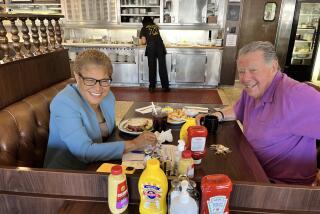Alarcon Proposes Anti-Gang Injunction
- Share via
NORTH HILLS — In an effort to tackle an open-air drug market on Orion Avenue, Councilman Richard Alarcon has urged prosecutors to consider seeking an anti-gang injunction similar to others credited with reducing crime around the city.
The injunction proposal is merely at a discussion stage, according to Alarcon, who said police and housing authority officials, among others, need to be consulted.
“We are looking at an entire package of efforts, and we asked to see if that area meets the specific criteria that are required for an injunction,” he said.
The idea was conceived by Alarcon after reading a series earlier this year in The Times about a four-block section of Orion.
Part of the series described how the local gang runs an open-air drug market and the risks faced by families who rarely venture out of their apartments for fear of harm.
In a letter, Alarcon asked the Los Angeles city attorney’s office to study whether court-ordered restrictions on actions considered conducive to gang activity--such as carrying pagers or even gathering or speaking to one another in public places--could be justified.
The injunction would cover Orion--which runs along the east side of the San Diego Freeway--from Parthenia to Nordhoff streets.
A handful of other injunctions in Southern California--including one on Blythe Street near the Orion neighborhood--have been credited by some with reducing crime. Others say they infringe on civil rights and merely shift crime to other neighborhoods.
Since the late 1980s, the Orion neighborhood has been well-known among drug users as a source for easy access to narcotics, said Capt. Vance Proctor of the Los Angeles Police Department’s Devonshire Division.
Though the incidence of some crimes in that area, including murder, rape and robbery, fell by 10% from 1993 to 1996, narcotics sales are persistently strong, he said.
Proctor said the injunction would be welcomed by the Devonshire station.
“I think it’s a very viable tool when it’s focused on a very small area,” he said.
Some in the community don’t think an injunction is needed.
“The general opinion here is that it’s an outside organization once again telling us what we need in our neighborhood,” said Jim Hamilton, pastor of the United Methodist Church of Sepulveda. He said he spoke for the majority of 20 community groups that held a meeting at his church Wednesday afternoon.
He said an injunction may have been needed three years ago, when drug sales were out of control. But sales have declined recently, said Hamilton, who in The Times series acknowledged tipping the gang off to police drug sweeps in advance.
“The police are doing a good job. You hardly see [drug dealers] standing on the streets.” An injunction, he said, would “crack some real good people.”
Other community leaders could not be reached for comment.
Proctor said a court order is only one crime-fighting tool being considered by the Devonshire station. Other options include a special anti-drug task force.
“The mere presence of a great number of officers deters narcotics sales,” he said.
Alarcon said the city may also use two units that combine LAPD officers and members of the city Building and Safety Department--the Criminal Nuisance Abatement Project and Focused Attack Linking Community Organizations and Neighborhoods, or FALCON--to pressure landlords into maintaining properties and evicting drug dealers.
Formulating an actual injunction could take time.
First, the city attorney’s office has to verify a set of criteria, including that a crime problem persists and identifiable gang members are responsible, Alarcon said.
So far, only one meeting has been held between the councilman and city attorney’s office staff. “We have to see whether or not we have the resources,” Alarcon said.
*
Correspondent Darrell Satzman contributed to this story.
More to Read
Sign up for Essential California
The most important California stories and recommendations in your inbox every morning.
You may occasionally receive promotional content from the Los Angeles Times.













